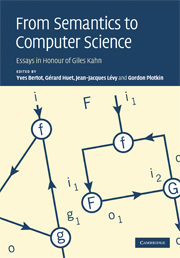Book contents
- Frontmatter
- Contents
- List of contributors
- Preface
- 1 Determinacy in a synchronous π-calculus
- 2 Classical coordination mechanisms in the chemical model
- 3 Sequential algorithms as bistable maps
- 4 The semantics of dataflow with firing
- 5 Kahn networks at the dawn of functional programming
- 6 A simple type-theoretic language: Mini-TT
- 7 Program semantics and infinite regular terms
- 8 Algorithms for equivalence and reduction to minimal form for a class of simple recursive equations
- 9 Generalized finite developments
- 10 Semantics of program representation graphs
- 11 From Centaur to the Meta-Environment: a tribute to a great meta-technologist
- 12 Towards a theory of document structure
- 13 Grammars as software libraries
- 14 The Leordo computation system
- 15 Theorem-proving support in programming language semantics
- 16 Nominal verification of algorithm W
- 17 A constructive denotational semantics for Kahn networks in Coq
- 18 Asclepios: a research project team at INRIA for the analysis and simulation of biomedical images
- 19 Proxy caching in split TCP: dynamics, stability and tail asymptotics
- 20 Two-by-two static, evolutionary, and dynamic games
- 21 Reversal strategies for adjoint algorithms
- 22 Reflections on INRIA and the role of Gilles Kahn
- 23 Can a systems biologist fix a Tamagotchi?
- 24 Computational science: a new frontier for computing
- 25 The descendants of Centaur: a personal view on Gilles Kahn's work
- 26 The tower of informatic models
- References
20 - Two-by-two static, evolutionary, and dynamic games
Published online by Cambridge University Press: 06 August 2010
- Frontmatter
- Contents
- List of contributors
- Preface
- 1 Determinacy in a synchronous π-calculus
- 2 Classical coordination mechanisms in the chemical model
- 3 Sequential algorithms as bistable maps
- 4 The semantics of dataflow with firing
- 5 Kahn networks at the dawn of functional programming
- 6 A simple type-theoretic language: Mini-TT
- 7 Program semantics and infinite regular terms
- 8 Algorithms for equivalence and reduction to minimal form for a class of simple recursive equations
- 9 Generalized finite developments
- 10 Semantics of program representation graphs
- 11 From Centaur to the Meta-Environment: a tribute to a great meta-technologist
- 12 Towards a theory of document structure
- 13 Grammars as software libraries
- 14 The Leordo computation system
- 15 Theorem-proving support in programming language semantics
- 16 Nominal verification of algorithm W
- 17 A constructive denotational semantics for Kahn networks in Coq
- 18 Asclepios: a research project team at INRIA for the analysis and simulation of biomedical images
- 19 Proxy caching in split TCP: dynamics, stability and tail asymptotics
- 20 Two-by-two static, evolutionary, and dynamic games
- 21 Reversal strategies for adjoint algorithms
- 22 Reflections on INRIA and the role of Gilles Kahn
- 23 Can a systems biologist fix a Tamagotchi?
- 24 Computational science: a new frontier for computing
- 25 The descendants of Centaur: a personal view on Gilles Kahn's work
- 26 The tower of informatic models
- References
Summary
Foreword
Gilles Kahn and I were classmates at École Polytechnique where, in the academic year 1965–1966, he taught me programming (this was in MAGE 2, a translation in French of Fortran 2 I believe, on a punched tape computer SETI PALAS 250), then we met again and became good friends at Stanford University, where he was a computer science student while I was in aeronautics and astronautics. Our paths were to get closer starting in the spring of 1980 when we started planning and, from 1983 on, heading INRIA Sophia-Antipolis together.
Gilles has always believed that game theory was worth pursuing. He was adament that our laboratory should take advantage of my being conversant with that topic. He was instrumental in maintaining it alive in the lab.
He was to be later the president of INRIA who presided over the introduction of “biological systems” as a full-fledged scientific theme of INRIA. Although this was after I had left INRIA, this again met with my personal scientific taste. I had by then embraced behavioural ecology as my main domain of interest and of application of dynamic games, much thanks to Eric Wajnberg, from INRA, but also out of an old desire of looking into the ecological applications of these techniques.
It is why I think fit to write here a few words about games and behavioural ecology, and also population dynamics and evolution, which are closely related topics.
- Type
- Chapter
- Information
- From Semantics to Computer ScienceEssays in Honour of Gilles Kahn, pp. 465 - 488Publisher: Cambridge University PressPrint publication year: 2009



